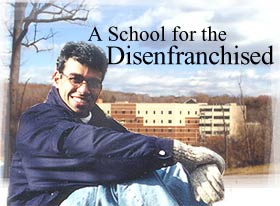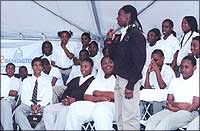The Rediff US Special/ Aseem Chhabra

Before graduating from Princeton University, Rajiv Vinnakota wondered if
he should enter medical school. But being burnt out from studying molecular
biology, and earning a certificate from the Wilson School in politics as well,
he decided to do something different.
So he joined Mercer Management Consulting in 1993, and within three
years, he was promoted three times. But he wasn't entirely happy. The
"social pull" his immigrant parents, who are both educators, had instilled in
him from boyhood was gnawing at him.
"If I was to stay in the for-profit world, I'd be at Mercer," he would tell the
Princetonian after a few years. "It was a great learning experience. I
learned so much that I can apply to the non-profit world."
At a Princeton reunion in 1994, he brought up urban policy and education
with some of his classmates. He had wondered for many years about the
plight of minority students in big cities -- and how after school they went
back into their crime-ridden neighborhoods and fractured homes, instead of
playing and studying in a motivating atmosphere.
Only if there were boarding schools for them, he thought. The safe
environment of a boarding school would allow the children to learn better in
a nurturing environment.
Today 29-year-old Vinnakota, who studied at one of the best universities in
the world, is the president of a public charter school in Washington DC.
The first chartered boarding school of its kind in America, it is called SEED
(the acronym for Schools for Educational Evolution and Development).
In three years since its founding, SEED School has 40 students, 20 boys
and 20 girls, enrolled each year. The amount of publicity the school has
drawn has got Bill Gates interested in it.
In 1996 Vinnakota took a two-month leave of absence from Mercer and
traveled the country on an exploratory mission, visiting various boarding
schools. Finally, in February of 1997, he organized a two-day weekend
retreat at Mercer's Washington DC office to put his vision into action.
Three things that students from disadvantaged families were missing out on
were identified: strong schooling that would prepare them for college; a
home that provided the simplest of necessities, such as three meals a day, a
shower, clothes, and the support to ensure that homework gets done; and
the values of the family and the environment.
"I always tell people, the question for me was not if I was going to college,
but where I was going to go to college," Vinnakota said.
It was clear that the school project would be a major commitment, from
more than one person. So Vinnakota and his friend Eric Adler -- an MBA
from Wharton School and now the executive director of the SEED
Foundation -- both quit their jobs. For 18 months they lived off their savings
and finally in 1998 the SEED school was started.
The school is a charter institution -- an independent public school that is
accountable to city regulations. It also must be a school of choice, and
cannot deny a child based on their academic records, athletic abilities, race
or gender.
Naturally, there are size constraints. The SEED school accepts applications
and then the 40 students are picked by a federal court judge in a lottery.
"At the same time, once they come to our schools, we have standards and
rules of conduct and they still have to meet those rules," Vinnakota said. "So
we still have the right to kick them out if they don't meet those rules."
 It is still early to say how the students have fared as compared to other
children in their age group, across the country and in Washington DC.
"Bear in mind, the school has been in operation for only three years,"
Vinnakota said. "We have seen fundamental improvement in their academic
skills and also in their self-esteem. But we are not seeing the exponential
academic increase that we would like to eventually see."
It is still early to say how the students have fared as compared to other
children in their age group, across the country and in Washington DC.
"Bear in mind, the school has been in operation for only three years,"
Vinnakota said. "We have seen fundamental improvement in their academic
skills and also in their self-esteem. But we are not seeing the exponential
academic increase that we would like to eventually see."
The children definitely are aware of their privileged position. Last
summer, eight of them traveled to Greece, courtesy the US Greek
ambassador.
The school was awarded $7,500 per pupil from the city's education
budget. Vinnakota and his colleagues got the US Congress to pass an
amendment to get more funding, since they are running a boarding school.
Currently the SEED school receives approximately $18,000 per student.
The families do not have to pay for their children, although they are required
to commit to four hours a month of volunteer work at the school.
For the first two years the school was housed in an abandoned convent
attached to the Capital Children's Museum. The school has moved to a
permanent campus -- an old burnt out elementary school near the RFK
Stadium. The cost to build a school and a 300-person dormitory on the
campus (already half completed) is $25 million. Half the money has already
been raised from private foundations and individual donors.
Vinnakota gives credit to his late grandfather and his parents for his
commitment to education and the desire to give back to society.
Vinnakota is named after his paternal grandfather, who died 10 days before
he was born.
The senior Vinnakota was a farmer a small village in Andhra Pradesh. He
earned Rs 30 a month and spent Rs 24 on the education of his six children.
All of Vinnakota's aunts and uncles are now successful doctors, lawyers
and professors in the US.
"It really impacted me on some level to learn about what kind of values my
grandfather had, who I never met," he said. "You wonder about the soul
going on to the next generation. My parents always taught me, not
necessarily in words, the importance of giving and helping others."
"(Starting the SEED School) became a thing I could do. There are a lot of
good management consultants out there making a lot of money. But when I
looked at myself in my mid-twenties, I asked myself, 'Is this the real
footprint I want to leave in life?' When I am 35 and looking back at my
20s, where do I want to be?"
Design: Dominic Xavier
Back to
top
Tell
us what you think of this feature